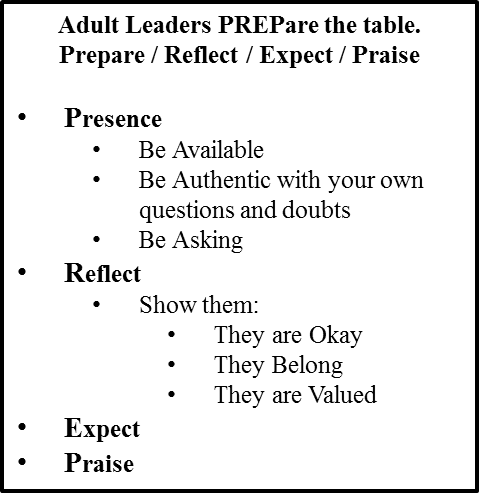By Neil Christians
At the First Third Conference on “Why Can’t Church be more like Camp?” there was a lot of talk about adults needing to prepare the table. This is what happens at camp which most of us don’t do effectively in the church. So in our congregations, we need to prepare the table for students as they come to church and then expect God to work in their lives. We prepare the table for them to have God moments. We must create on environment where they feel comfortable and welcome; a place where they can grow in faith.
But HOW do we do this? How do we get adults to help shape this? I’ve been giving this a lot of thought and have come up with one way that you could apply this to your context. Let me know what you think.

Presence
Being present is not just showing up. It’s much more than that. It’s about being present in the lives of our students. And these adults must be mature enough to share their own questions about God and faith. It’s not just putting on a mask for the church or for the students. It’s about being truly present by being honest in who you are. Students can tell when we are ourselves and when we’re putting on a front. They can also tell if we are truly interested in what is going on in their lives. This is what we mean by being truly present with students.
It is healthy for students to see adults engage in honest wonder and even to disagree with one another in order to
Why is it healthy for students to see adults who question faith and who disagree with one another? It models mature healthy conversations. Students think that once they’re confirmed that they should have all of the answers and when church falls short of answering all of their questions, they abandon the community. They need to see that as our circle of knowledge expands, so does the circumference our questions. We need to create in our students the art of asking questions rather than just giving answers. Giving answers is easy. Asking the right questions, that is hard. Teaching students to ask questions brings about a community of awe and wonder of God.
Our adults also need to be more than just the “Triple A Adults” of Available, Authentic and Affirming. They must be ASKING adults. Ask students what is going on in their lives. Adults neeordd to know what activities they are involved in, what is going on in their families and what things they are interested in. Ask them about their day/week. Ask them their questions about faith. We believe that God is not confine to the church “God box”. God is active in the lives of our students and we need to actively listening to what God is up to in their every day lives.
Having students give a high and a low for the week is a great place to start. Also, having students fill out cards about themselves and what there are active with and interested in is a fun way to get to know students. Adults can see connections between different students and also offer up a “guess who this is” game.
A question box is also a great place to start with your bible study questions! . Don’t be afraid to say, “I have NO idea.” Students need this. You can also have your adults to keep a book of “stump the pastor” questions that the group comes up with. Then have the pastor come in and present them with the groups questions.
Once we get students talking, then we need to listen. A good rule of thumb for every adult is if you are talking more than 30% of the time, then you are talking too much! We listen to our students and then we show them where God is active. Most people don’t see God in their lives and it is up to us to show them where we see God active.
See Part 2 of Neil’s post tomorrow!
Join the conversation on Facebook.com/FirstThird!

Neil Christians is the Director of the Family Ministry Team at Christ Lutheran Church in Charlotte, NC. He has been in paid children,youth and family ministry for 20 years and is passionate about mentoring others in a life of faith. Other passions include Harry Potter, movie clips and his favorite band Switchfoot. So, watch for references to these in his blog posts.

